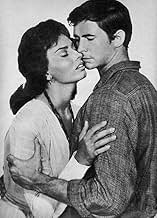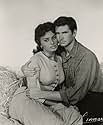IMDb RATING
6.5/10
1.5K
YOUR RATING
Desperation and secret passions on a family farm lead to tragedy.Desperation and secret passions on a family farm lead to tragedy.Desperation and secret passions on a family farm lead to tragedy.
- Nominated for 1 Oscar
- 3 nominations total
Rebecca Welles
- Lucinda Cabot
- (as Rebecca Wells)
Edna Bennett
- Housewife Gossip
- (uncredited)
Florine Carlan
- Young Girl
- (uncredited)
Robert Cass
- Seth
- (uncredited)
- …
Vera Denham
- Farm Woman
- (uncredited)
Harvey B. Dunn
- Farmer
- (uncredited)
Dick Elliott
- Old Farmer
- (uncredited)
Jamie Forster
- Farmer
- (uncredited)
Greta Granstedt
- Men
- (uncredited)
Sandra Harrison
- Young Girl
- (uncredited)
- Director
- Writers
- All cast & crew
- Production, box office & more at IMDbPro
Featured reviews
This movie was made primarily as a star vehicle and things like the artistic integrity of the plot were thought of as unimportant. Needless to say, the movie suffered noticeably.
I saw this movie originally as part of a course on plays made into movies. Though this wasn't the most badly manhandled of the plays that we studied, it is a close second to "Sexual Perversity in Chicago" which became "About Last Night" staring Rob Lowe and Demi Moore.
Don't get me wrong, it's not a bad movie, but it could have been great.
As much as I hate to say it, this is one of the rare cases where a remake might be in order. It is possible to imagine that a director willing to make a more faithful rendition could easily create something better than the original.
I saw this movie originally as part of a course on plays made into movies. Though this wasn't the most badly manhandled of the plays that we studied, it is a close second to "Sexual Perversity in Chicago" which became "About Last Night" staring Rob Lowe and Demi Moore.
Don't get me wrong, it's not a bad movie, but it could have been great.
As much as I hate to say it, this is one of the rare cases where a remake might be in order. It is possible to imagine that a director willing to make a more faithful rendition could easily create something better than the original.
Anthony Perkins and Sophia Loren are absolutely gorgeous in this ca. 1840 "Western". That alone, however doesn't help a ridiculous story, with countless historically incorrect elements.
Byrl Ives is convincing as the 70-something tyrannical patriarch, an egomaniac who swears to see his 100th birthday. His wild dancing at a party he gives for his neighbors will make anyone take notice (this guy is SEVETY SIX?). Always mumbling Bible verses, he demands respect, while driving sons and friends away with his self-righteous rantings and emotional cruelties.
The love affair between Perkins and Loren at first appears absurd, but becomes believable near the end. There is plenty of drama, but not enough to feel good about. Clearly written for the stage, this story was dated even when it was filmed. Perkins whistles "My Bonnie" in the 1840s, although the song wasn't composed until 1882.
Critics knocking Sophia Lorens "command of the English language" are rather petty. I found her English flawless and completely audible. As a Neapolitan, Loren speaks a distinct dialect that often had to be dubbed into "proper Italian". Her "accent", however, hardly affects how she speaks English. As a first Generation German American, I can appreciate the efforts of those who learn English as a second, or even third or fourth language.
"Desire Under The Elms" is a drama (or even a tragedy) in the Classic Sense. For my enjoyment is was missing a logical story and an overall "pay off" for the time invested. Fans of the stars won't want to miss it, others, however, tune in at your own risk!
Byrl Ives is convincing as the 70-something tyrannical patriarch, an egomaniac who swears to see his 100th birthday. His wild dancing at a party he gives for his neighbors will make anyone take notice (this guy is SEVETY SIX?). Always mumbling Bible verses, he demands respect, while driving sons and friends away with his self-righteous rantings and emotional cruelties.
The love affair between Perkins and Loren at first appears absurd, but becomes believable near the end. There is plenty of drama, but not enough to feel good about. Clearly written for the stage, this story was dated even when it was filmed. Perkins whistles "My Bonnie" in the 1840s, although the song wasn't composed until 1882.
Critics knocking Sophia Lorens "command of the English language" are rather petty. I found her English flawless and completely audible. As a Neapolitan, Loren speaks a distinct dialect that often had to be dubbed into "proper Italian". Her "accent", however, hardly affects how she speaks English. As a first Generation German American, I can appreciate the efforts of those who learn English as a second, or even third or fourth language.
"Desire Under The Elms" is a drama (or even a tragedy) in the Classic Sense. For my enjoyment is was missing a logical story and an overall "pay off" for the time invested. Fans of the stars won't want to miss it, others, however, tune in at your own risk!
Desire Under the Elms is one of those films that is a lethal combination: sordid and sluggish. It's not as though it would have been much better or less offensive if it went at a faster clip, but the funereal pacing only makes you recognize how hopeless it all is. The three leads try (and Burl Ives in particular gets well into the part), but at this point, the tale of a forbidden love affair and its consequences, once a much praised play by Eugene O'Neill, feels more like one of those horribly overheated and vulgar true crime stories that feature on TV as you race to move on to another channel. What can you really say when you can't stand any of the parties in this love (or is it lust) triangle? As Audrey Hepburn might have said in Breakfast at Tiffany's, they are all "superrats". What little there is that is salvageable to some degree is the remarkably crisp black-and-white cinematography and yet another fine musical score by Elmer Bernstein. Otherwise, a complete wash.
Loren and Perkins smoke up the screen in this black and white, well-done love story. It is fascinating to see how quickly an all-American father and son can be weak for the same foreign woman. Sophia is wonderfully foreign, very talented in an early role. Anthony Perkins and she have surprisingly strong chemistry, the first kiss between them is one of the hottest kisses in the cinema. Burl Ives does an outstanding job as the miserly father who nabs himself a young pretty foreign wife. Sophia makes you believe she is married to Burl, she represents many a foreign wife who have married for economy. Anthony Perkins shocks you with his hatred and rivalry with his father.
After a couple of studio films shot on location, Italian actress and sex symbol Sophia Loren finally made it onto Hollywood soil for this uneven, uncertain melodrama adapted from Eugene O'Neill's controversial play. A tyrannical New England farmer (Burl Ives), who apparently worked his past two wives to death, brings home a new wife to meet his sons--two of whom take off for California and the third (Anthony Perkins) who stays and eventually falls in love with the Mrs. The performers seem to be at a mismatch with this very strange material; though they try hard, the heavy prose and illogical situations would be enough to defeat anybody. The character motivations aren't always clear, not helped by the narrative which, at a crucial point, jumps ahead in time and nearly alienates the audience. Ives gives a full-throttle, blustery-old-windbag performance which infuses the scenario with a prickly tension (and the screenplay surprisingly never scores points against him), but glinty-eyed Loren is a bit out of her depth. Still, she survives the absurd final reel with her dignity intact, while the picture ends on such a dour note that the overall impression is one of supreme dissatisfaction. Daniel L. Fapp won an Oscar nomination for his handsome (if overlit) photography; Delbert Mann directed in an awkward and stagy fashion. **1/2 from ****
Did you know
- TriviaThe original 1924 Broadway production made Walter Huston a Broadway star; he was 40 years old, playing a septuagenarian. He was later in several more Eugene O'Neill plays.
- GoofsIn several outdoor scenes, people cast two (or more) shadows showing that there are two light sources.
- ConnectionsFeatured in Biography: Sophia Loren: Actress Italian Style (1997)
- How long is Desire Under the Elms?Powered by Alexa
Details
- Runtime1 hour 51 minutes
- Color
- Aspect ratio
- 1.85 : 1
Contribute to this page
Suggest an edit or add missing content

































